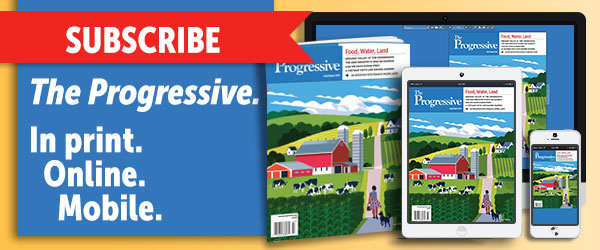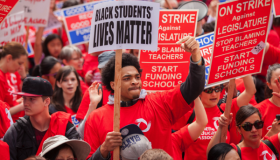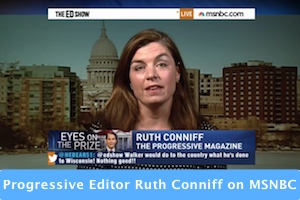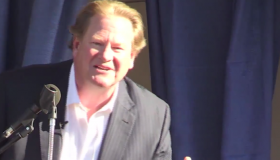The more you look into now-Saint Serra, the more stomach-turning he becomes.

In debates about education policy, probably no word is more abused than the term "progressive."
Proponents of ideas generally associated with the political left often call their ideas progressive. But what does progressivism really mean in the education policy world? Do folks identifying as political progressives also support the education policies of the Obama administration? Are standardized tests serving progressive purposes in our schools? Are charter schools necessarily a progressive idea? Answers to those questions vary depending on who you ask.
Progressive education actually has a deep tradition in America founded on very specific values. Nevertheless, the progressive perspective is often absent from policy discussions or atrociously misrepresented.
To correct the narrative about progressive education and clarify what are truly progressive principles in education policy, The Progressive magazine, one of the nation's oldest and most distinguished progressive publications, has formed The Progressive Education Fellows.
The Progressive Education Fellows are an assemblage of a dozen prominent advocates, commentators, and thought leaders in the progressive education movement. Their point of view will generally offer a diverse counterpoint to current top-down reform mandates that stress standardization, high-stakes testing, and market competition for public schools.
Independent and nonpartisan, the Progressive Education Fellows will differ from most other education policy sources in that its members are grounded in the social, democratizing movement in education that began in the early 20th century.
Right now, when current education policies have so obviously faltered and alternatives are needed, the formation of this new policy group brings into the debate an important voice that has for too long been overlooked or misunderstood.
The progressive ethic that emerged under the name “progressive education” in the early 1900s focused on the validity of childhood, the special needs of children, and the interests of children as a national collective responsibility of everyone. In the progressive mindset, investments in children's wellbeing are justified on the basis of being good for children, not on the basis of heightening their "education output" or ensuring their future utility as workers and consumers.
Famed educator Debra Meir has characterized progressive education philosophy as "a belief that students belong at the center of the learning process, that they need to be in charge of their own learning, that learning should take place in the context of meaningful and authentic tasks, and that learning is social and interactive."
In discussions of school policy today – with their preoccupation with test scores and data points – the intrinsic value of students as human beings is often lost, and learning is often viewed a an means to an end – either a test score, graduation, or college degree – rather than a worthy activity to be respected for its own sake.
Education progressives seek to return the dignity of individuals and the wellbeing of the community to the center of the education enterprise in this country.
Progressivism is also a democratizing movement in education, upholding an egalitarian – rather than hierarchical – model for schools.
Because democracy implies community, progressivism insists students, parents, teachers, and members of the greater community of the school have a voice in school policies and practices. Because community implies working together, education progressivism is committed to diversity and equity. Because education progressives believe democracy is at the heart of school governance and decisions about policy and practice, they uphold the rights of teachers to organize and engage in collective bargaining.
This devotion to community and equity means education progressives reject the emphasis in current education policy on competition and self-interest. Progressivism also calls for an end to school governance in which decisions affecting students, teachers, and families are increasingly made by people who have the least proximity to the children those decisions affect.
This is not to say that the members of the Progressive Education Fellows are monolithic in their views. In their writing and thinking, some of the Fellows focus more on the unique needs of individual students and emphasizing child-centered practices, while others emphasize the importance of a community of learners and connection of the classroom to the broader community.
Some members of the Progressive Education Fellows are classroom teachers or have spent significant time in the classroom, while others come to their expertise as parents, scholars, or education justice activists. Each of the Progressive Education Fellows brings a significant depth of knowledge about the education conditions and policies in his or her city, state, or region, while at the same time, articulating a broad progressive education agenda for the nation.
Topics:
More
- Subscribe
- Featured Video
- Recent Stories
- Recent Comments
- Poetry

He abandoned his quest to become the Republican nominee late Monday afternoon in a small, drab, windowless room in a...
By Wendell Berry
Manifesto: The Mad Farmer Liberation Front
Love the quick profit, the annual raise, vacation with pay. Want more of everything ready made. Be afraid to know your neighbors and to die. And you will have a window in your head. Not even your future will be a mystery any more. Your mind will be punched in a card and shut away in a little drawer. When they want you to buy something they will call you. When they want you to die for profit they will let you know. So, friends, every day do something that won’t compute. Love the Lord. Love the world. Work for nothing. Take all that you have and be poor. Love someone who does not deserve it. Denounce the government and embrace the flag. Hope to live in that free republic for which it stands. Give your approval to all you cannot understand. Praise ignorance, for what man has not encountered he has not destroyed. Ask the questions that have no answers. Invest in the millennium. Plant sequoias. Say that your main crop is the forest that you did not plant, that you will not live to harvest. Say that the leaves are harvested when they have rotted into the mold. Call that profit. Prophesy such returns. Put your faith in the two inches of humus that will build under the trees every thousand years. Listen to carrion—put your ear close, and hear the faint chattering of the songs that are to come. Expect the end of the world. Laugh. Laughter is immeasurable. Be joyful though you have considered all the facts. So long as women do not go cheap for power, please women more than men. Ask yourself: Will this satisfy a woman satisfied to bear a child? Will this disturb the sleep of a woman near to giving birth? Go with your love to the fields. Lie easy in the shade. Rest your head in her lap. Swear allegiance to what is nighest your thoughts. As soon as the generals and the politicos can predict the motions of your mind, lose it. Leave it as a sign to mark the false trail, the way you didn’t go. Be like the fox who makes more tracks than necessary, some in the wrong direction. Practice resurrection.
Wendell Berry is a poet, farmer, and environmentalist in Kentucky. This poem, first published in 1973, is reprinted by permission of the author and appears in his “New Collected Poems” (Counterpoint).

















Add new comment